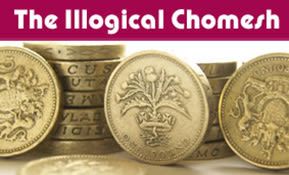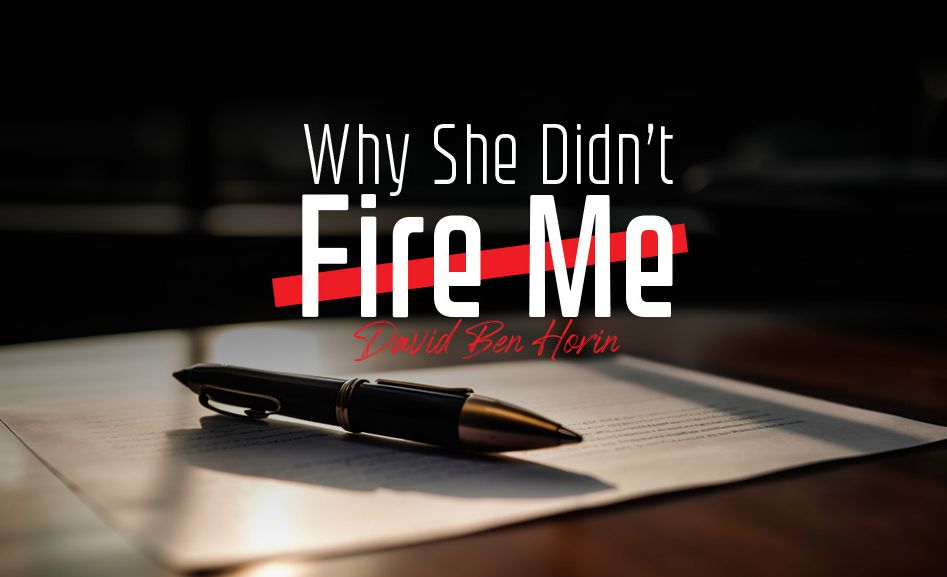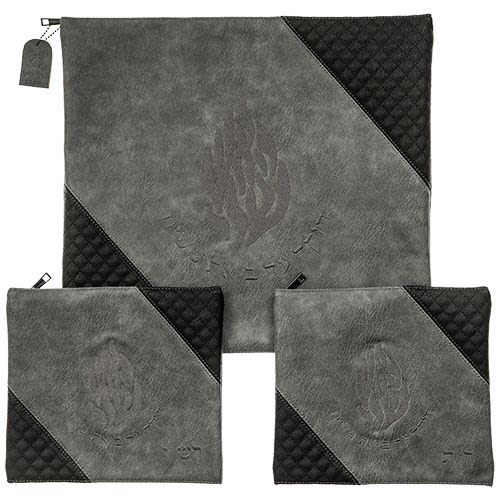
The Loyal Partner
Jewish Law states that anything one partner decides upon or says, the other is obliged to fulfill as well. So if Hashem is your partner, you’re in really good shape…

The Garden of Riches, Part 24
The Torah states (Deuteronomy, 6:5), “And you shall love the L-rd, your G-d, with all your heart and with all your soul, and with all your might.” “Sichot HaRan“, Rebbe Nachman’s Discourses, reveals that by donating “chomesh” – a fifth of one’s assets to charity – one is fulfilling the commandment of “with all your might”.
We find in the Code of Jewish Law that if one is able to do so, he should donate charity according to the needs of the poor. If this is beyond his capability, he should give a fifth of his belongings, which is considered a particular commendable fulfillment of this mitzvah; or a tenth of one’s property, which is the average. Anything less is considered “giving with an evil eye,” or stinginess.
There are people with unlimited funds, who donate even eighty percent of their assets, leaving only twenty percent for themselves. Others, who do not have such wealth, should donate twenty percent of what they own, and this is considered magnanimous. Donating ten percent is the “average” measure, and anything less than that is considered misery according to our sages.
The Loyal Partner
In his book Ahavat Chesed, the Chafetz Chaim writes that the act of charity of those who designate a tithe or fifth of all their profits is much greater than those who give without deliberately donating a specific percentage of their earnings. This is true even if the latter actually donate the same amount of money, for those who donate a tithe or fifth of their earnings indeed enter a partnership with the Hashem.
Chassidic tradition tells that the disciples of the Apter Rebbe (Avraham Yehoshua Heschel of Apta) came to him and told him that there is a simple Jew living in a distant village renowned for being a miracle worker. This Jew, who makes his livelihood serving drinks to the local gentiles, is known for his power to give blessings to his fellow Jews that are fulfilled immediately. Everyone he blesses has been reputed to see miraculous salvation!
The Rebbe was curious as to what enabled this simple Jew to be granted such a lofty power. This was especially remarkable considering that this Jew lived among the gentiles and spent his days serving them whiskey. The Rebbe assumed that there could only be one of two explanations: either he was no ordinary Jew but rather a hidden Tzaddik, or his power was G-d forbid a result of sorcery, through an alliance with unholy spiritual forces.
The Apter Rebbe decided to reveal the source of this Jew’s powers first hand. Dressing in simple clothing, the Rebbe arrived at this Jew’s inn. The Rebbe sat in a corner, observing him as he served drinks to his intoxicated customers. And so he watched as this Jew spent his hours laughing and talking with the drunken gentiles crowding the tavern, as if he were one of them. Too, the Rebbe observed how every so often a Jew would come in and ask the Jew for a blessing. First entered a frantic woman, and in tears pleaded that he would bless her desperately ill child. “May he have good health,” said the Jewish bartender and continued to pour ale.
Less than an hour passed, and the same woman came in, her face aglow with the biggest of smiles and her hands heavy with a big basket of fruit. “This is for you,” she said to the Jew, “my son has recovered fully!”
Shortly afterwards a most agitated young man entered and whispered his request in the Jew’s ear. The bartender said something to him. As in the first instance, here too the young man returned within a short while and thanked the bartender profusely.
And so again and again during the day the Apter Rebbe witnessed as more and more people came to ask for the Jew’s blessing, and returned shortly afterwards to thank him for the immediate salvation miraculously received.
The Rebbe could discern nothing particularly special in the Jew’s behavior or manner that would explain why his blessings were fulfilled so perfectly and so swiftly again and again. He saw only that the Jew spent most of his time pouring drinks for the drunken gentiles, taking only a very short break to pray the afternoon Mincha service. The Rebbe decided he would wait until nightfall, then perhaps he would discover that this supposed simple Jew was actually a hidden Tzaddik, studying the Torah all night, perhaps even with Eliyahu HaNavi. Yet, to his great disappointment, the Rebbe heard only the Jew’s heavy snoring. And so the Rebbe decided to stay for Shabbat, thinking that perhaps the Jew celebrated the Sabbath in a particularly holy manner and that would explain the power of his blessings. Yet again the Rebbe was disappointed, for there seemed to be nothing in the Jew’s Sabbath that was out of the ordinary.
One evening, after the last customers left the tavern, the Rebbe finally decided to approach the Jew and ask him directly. He introduced himself, and explained that he wished to know the source of the power of his blessings. The Jew looked at him most innocently and said, “Me? I have no power … it’s just luck.”
The Rebbe continued, “I have never witnessed such power of blessing, even amongst the great Tzaddikim. I ask you to please reveal from what source you receive such power. For if it is not coming from holiness, I must then conclude that your blessings receive their power from a place that is the very opposite of holiness and purity. I will have no choice but to state publicly this shame for all to know! Please, I ask of you to reveal immediately what is the power of your blessings!”
The bartender became truly frightened. With eyes full of tears he pleaded, “Rebbe! I promise you! I have no idea why my blessings are fulfilled! Truthfully, I am but a simple Jew. I am not righteous, but I do try in my simple manner to fulfill the commandments as best as I can. I certainly have never engaged in sorcery or any black magic! I promise you!”
The Rebbe saw that the Jew was speaking the truth. He softened his tone as he asked the Jew to please tell him about himself, to try to recall an instance when he had done a particularly great mitzvah that would explain all of this. Yet the Jew had no such memory.
“Perhaps this power comes to you in merit of your parents? Who were your ancestors?”
“My parents were simple people,” he replied, “They did not even know how to read and write. And so too were their parents…”
The Apter Rebbe was totally bewildered. He began to pray, “Master of the Universe. Please allow me to see from where this Jew receives the power to bless blessings that immediately turn into salvations! Please open my eyes so that I may see Your Ways, to understand in what merit this Jew possesses such a power.”
Suddenly something caught the Rebbe’s eyes that he had not noticed before. On the counter were two cash boxes into which the bartender divided his daily revenues.
“What is the meaning of these two cash boxes?” asked the Rebbe.
“These?” asked the Jew innocently, “these are for my profits.”
“But why two?”
“One for me,” replied the Jew, “and one for my partner.”
“And who is your partner?” asked the Rebbe.
“My partner? Hashem,” he answered in absolute innocence.
Of course the Apter Rebbe understood immediately that here he would discover the answer to his query. He asked the Jew how it came about that the Holy One Blessed be He Himself had become his business partner.
And so was his story. “A number of years ago, my family and I were almost bankrupt. At the same time, the saloon was in such a terribly dilapidated state, that I knew that without renovations no one would dare come here to drink. We barely had money for food. My wife insisted I take a business partner who would invest money to renovate this place before we would be left with no livelihood whatsoever. Yet I did not want to take any partner. My father had taught me that business you do alone and not with associates. And so I put my faith in Hashem; that He would take care that I would see better days.”
The bartender breathed deeply and continued, “Yet my sorry state did not improve. My wife pressured me so much that finally I gave in and headed towards the big city to seek out a business partner who would invest money into my failing business. On the way, however, I had great misgivings. I thought to myself, ‘What are you doing? What will you do when you arrive in the big city? Put your hopes in flesh-and-blood? Seek out someone who will do you a favor and invest his money, and you will then be in his debt the rest of your life?’”
He paused, sighed, and said, “And so I decided to address the Master of the Universe, and I said to Him, “Hashem, You have always helped me; You have always made it possible for me to manage without the aid of another human being. Now too I am certain that if I wait for Your salvation – it will indeed come. Master of the universe! I do not want a flesh-and-blood partner! But I will be very happy if You will agree to be my business partner! Merciful Father, give me money to make the necessary renovations, to refurnish the inn and restock the tavern. And we will share all profits equally – my family will live on my half of the revenues, and I will give Your half to charity and to support Torah scholars.”
“And so,” the Jew completed his story, “a few minutes later I saw a wallet on the side of the road. By its tattered appearance it was obvious that it had been forgotten there long ago. And the wallet was stuffed full with money. And so I came home, and made all the necessary renovations. The customers began to fill the tavern and so again I had a lucrative business. Since then, every evening I count the daily earnings and split them evenly between these two cash boxes. I use my half to support my family and donate the money from the other box to charity and to support Torah scholars.”
The Apter Rebbe laughed joyfully from the Jew’s astonishing and sincere innocence. He said nothing, simply blessed him and went on his way. When he returned home, he told his disciples, “When I heard that this man’s partner is none other than the Holy One Blessed be He, I understood everything! After all, it is written in the halacha pertaining to partnerships, that anything one partner decides upon or says, the other is obliged to fulfill as well. Therefore, every time this simple Jew said a blessing, the Holy One was obligated to fulfill the words that had been spoken by his partner.”
“Partners – are partners all the way! This simple Jew, in his innocence, gave half of all his earnings to his partner – the Holy One Blessed be He. And Hashem on His side fulfilled whatever promises His partner made. What a partner to merit!”
The Rebbe concluded, “I said nothing to this Jew, because I knew that due to his sincere innocence he had no idea of how great his deed is. I had no desire to ruin such innocence. It is better that he should continue his partnership in this way… It surely brings much pleasure to the Heavens…”













1/15/2010
beautiful Thank you that was absolutely beautiful. What a lesson!
1/15/2010
Thank you that was absolutely beautiful. What a lesson!